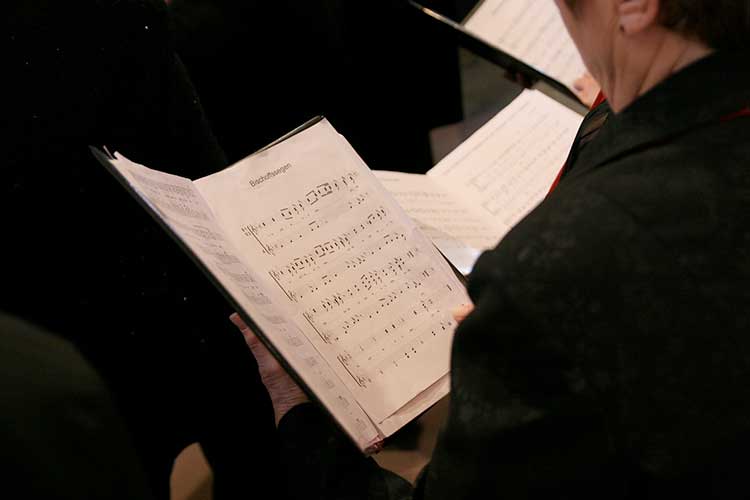Break forth in song
“God is glad when the craftsman at his bench, the maid at the sink, the farmer at the plough, the dresser at the vines, the mother at the cradle break forth in hymns of prayer, praise and instruction.”—Katharina Schutz Zell

Reflections by Kaylena Radcliff
Do you have any strange quirks?
I’ll be honest. I have plenty of them. But it was only after I heard my 18-month-old daughter, mimicking a jaunty bathtime tune I had absentmindedly composed that I realized one of my more prominent quirks—I narrate my actions in song. As it turns out, I’m a walking musical, and not a particularly good one, either. And the worst part? It occasionally happens in public.
Barring rare cases of spontaneous musical output or maybe devout religious settings, the unabashed (and probably mediocre) singing of common people going about their business seems a bizarre thing. Sure, it’s acceptable to have private jam sessions in the comfort of your car or shower, but shouldn’t public places be off limits?
This unwritten social norm wasn’t always the case. In fact, at some times and in some places, public outbursts of song were encouraged.
Though some reformers eschewed music, for others, like Martin Luther, it was “a gift of God to be nurtured and used by man for his delight and edification, as a means for giving praise of the Creator, and as a vehicle for the proclamation of God’s Word.”

Formal singing.
In 1517, as the news of Luther’s writings and ideas spread quickly, it reached the small town of Strasbourg. There, an aristocratic and pious Roman Catholic named Katharina Schutz lived, enduring her own struggle with many of the same questions Luther had.
Under the teaching and guidance of her priest, Matthew Zell, Katharina embraced Luther’s answers. Matthew and Katharina were married soon after- before many of the Reformers, in fact- and the couple pioneered a model for marriage in ministry.
Katharina served alongside her husband as a prolific writer, defender of the Reformation, pamphleteer, servant to the poor and the refugee, and minister to the common people. Like Luther, Katharina possessed a biting wit and a penchant for strong rhetoric, which often embroiled her in controversy.
But one of Katharina’s primary concerns was for the spiritual life of laypeople. Desiring to connect and imbue common work with devotion and spiritual significance, Katharina began compiling and publishing hymns in pamphlet form. Singing the promises and praises of Scripture would be a simple but effective way to engage with and respond to their Creator- even in the midst of the common, the menial, and the tedious. And it was then she penned her explanation, given in the quotation above.
Also included in her reasoning behind the compilations she wrote: “When so many filthy songs are on the lips of men and women and even children I think it well that folk should with lusty zeal and clear voice sing the songs of their salvation.”
Today it’s easy to relegate the songs of our salvation to our worship services and forget to reprise them throughout the week. And I get it- some people aren’t chronic singers. We’re wired differently. Indeed, a private and prayerful devotional life is a beautiful act of worship in itself.
But as I concoct silly ditties or mindlessly croon the last thing I heard on the radio, I have to admire those who instead “break forth in hymns of prayer, praise, and instruction.”. Maybe the songs I sing aren’t as filthy as the ones Katharina described, but thoughtless singing does little to remind me of the manifold life-giving promises and praise-worthy truths of Scripture. Hymns, psalms, and spiritual songs, however, grant me free and simple access to God’s Word, an attitude of prayerful consideration with which to approach Him, and a magnificent sense of proportion that counteracts the joy-dwarfing tedium of daily living.
And if I have to have a strange quirk, I might as well put it good use.
Kaylena Radcliff is the author of The Torchlighters Corrie ten Boom biography and a lay editor and subscription manager at Christian History magazine.
(Join us each Thursday for a fresh look at a quote from the Reformation era! Sign up via our e-newsletter (in the box at the right) or through our RSS feed (above), or follow us on Facebook thorugh October as we celebrate 500 years of Reformation.)
Read Kaylena's book on Corrie ten Boom and enjoy the Torchlighters series



